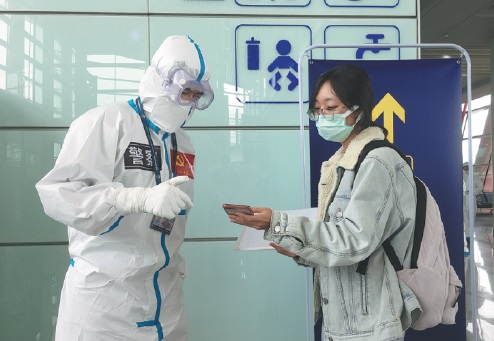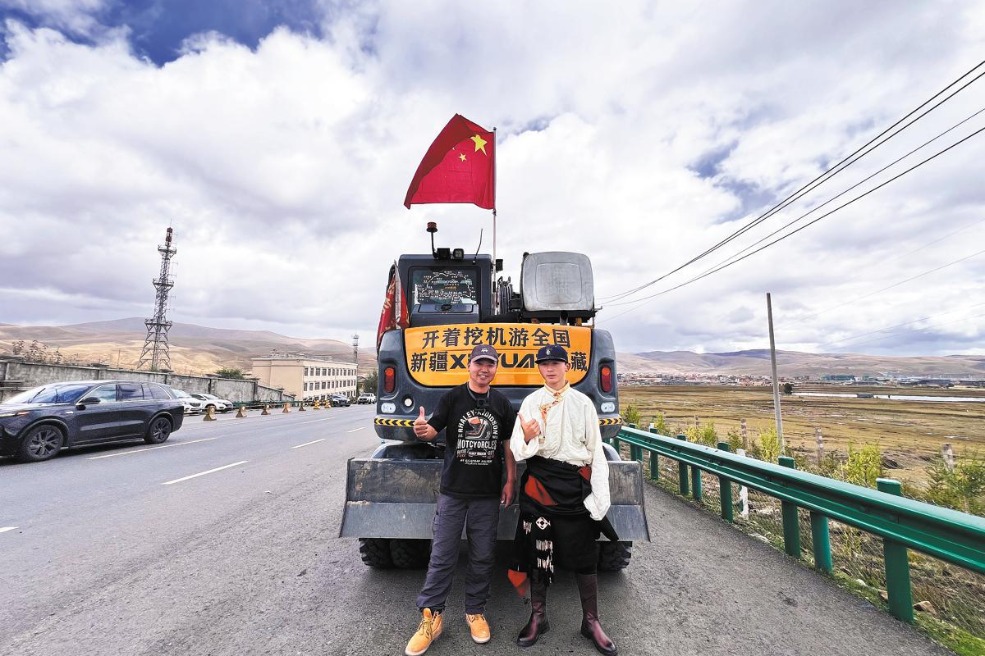Officer oversees airport's security


It was 1 am, and Lu Tao had just finished his shift in Zone D of Terminal 3 at Beijing Capital International Airport. The zone is a special area established to handle all inbound passengers and minimize the risk of imported cases of the novel coronavirus.
However, instead of heading to a dormitory to rest, Lu jumped into a police car for a quick nap and drifted off to sleep amid the rumble of passing luggage trucks, shuttle buses and maintenance vehicles.
"I just needed a place to crash before my next shift six hours later," said Lu, vice-captain of a task force established by the airport's public security bureau to prevent and control imported cases.
"It's a blessing that I can fall asleep quickly wherever I lie down," he said, adding that after several days he had found a comfortable position to sleep in the car.
As the coronavirus began to spread rapidly overseas, the airport-one of China's busiest hubs for international flights-stepped up its defenses against imported cases. On March 10, Zone D was designated as an exclusive area for testing travelers arriving from overseas.
The new measures placed greater pressure on Lu and his colleagues to ensure strict health controls.
"On the second day of the Spring Festival holiday, I received a message from the bureau telling me to return to Beijing within two days, which was an abrupt end to my trip home (to Shandong province)," he said.
With people flying back to the capital after Lunar New Year, Lu sensed that the real test was still to come. Anticipating a long stint at work, he prepared as many daily necessities as possible for his wife and 2-year-old daughter as no delivery services were allowed to enter their compound in the capital.
The day before Zone D was due to start operations, the bureau established a 40-member task force to control the area and Lu was appointed as vice-captain.
Rapid response
That left him just one night to conduct an on-site appraisal and come up with security procedures, develop work plans, find temporary dormitories for his colleagues and prepare daily necessities and protective gear.
By 4 am on March 10, just hours before the first batch of inbound travelers arrived at Zone D, Lu had solved all the problems.
However, five days later, the job became far more arduous. Zone D, which had only handled flights from countries and regions with serious coronavirus situations, began processing all inbound flights, no matter where they came from.
"From about 10 flights and 1,500 passengers per day in the first stage to more than 40 flights and 7,000 passengers-we were overwhelmed by the influx of travelers," Lu said.
When several large aircraft landed at the same time on March 15, a huge number of passengers and their luggage clogged Zone D. Some people eventually lost patience and vented their anger while waiting in the crowded space.
Lu worked for 20 hours straight, moving to the front of lines to communicate with passengers-h(huán)e speaks some English-and treat them with courtesy.
"When getting off the plane after a long, exhausting flight, all the passengers could see was people wearing protective clothing, and all they could do was wait. It's understandable that they might have some complaints," he said.
On March 20, Lu received a call informing him that an unaccompanied 14-year-old passenger was anxious after recording a high body temperature.
Though he was taking a break, Lu rushed to the zone and stayed with the teenager for several hours until he was taken to the hospital.
"It wasn't about my work responsibilities-it's what any parent would do," he said. "I'm the father of a 2-year-old daughter, and I want every child to feel safe and secure in our country."
Since March 23, in a bid to ease the pressure on the capital's capacity to handle imported coronavirus cases, all international flights to Beijing have been diverted to 12 designated airports as their first port of entry to China.
"Though it has really eased our workload, we still need to stick to our posts in Zone D until the country wins the battle against the virus," Lu said.
- Train attendants gear up for Spring Festival travel rush
- World's largest pile-driving vessel delivered in East China
- China to have national data infrastructure in place by 2029
- Top court pledges punishment of unfair competition, monopoly in high-tech fields
- China launches communications center to spotlight wild tiger, leopard protection
- China launches test satellite for orbital refueling





































